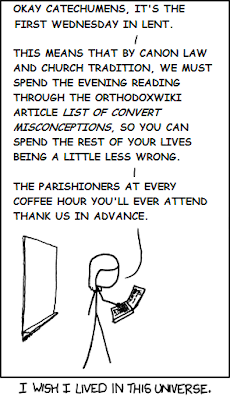10 October 2011
epigram 3
-Robert Taft, S.J. "Eastern Presuppositions" and Western Liturgical Renewal
06 October 2011
Ortho HumbleBrag #1
Wow, ttly lost my place on new 1,000-knot prayer rope. Guess that happens after u do Reader's All-Nite vigil! :P
28 September 2011
19 September 2011
epigram 1
-'The Honour of Israel Gow', The Innocence of Fr. Brown. Chesterton, G. K.
03 February 2011
Λειτουργία: A Modest Proposal
The historical meaning given for the Greek word 'liturgy' is one of the most commonly made mistakes following the 20th cent. Liturgical Movement. The fashionable trope goes like this:
'Liturgy' means 'work of the people'.
This is wrong.
It is no more true than to say that the English 'cupboard' is ‘a plank of wood used as a drinking vessel’. Yes, 'cup' and 'board' individually have the meanings of 'drinking vessel' and 'plank of wood', and one can try to envision the compound word having the absurd meaning given above, but this would be a mistaken understanding.
What 'liturgy' actually meant to the Greek-speakers who chose to use it in the Scriptures was:
a public duty, which the richer citizens discharged at their own expense.*
Examples of a 'liturgy': a private citizen paying to build a theatre, throwing a public festival, or building a war ship. It was the act of one for the benefit of all.
This dramatically alters the meaning from the current popular, mistaken understanding. It is not what 'we do' all together, it is rather what One does for our benefit. This correct understanding is enshrined in the opening dialogue; this, from deacon to priest:
It is the time of the Lord to act. **
Thus, the One effecting the 'liturgy' is not the congregation in a 'work of the people' (neither is it a clericalistic performance piece), rather it is the Lord Who acts, for the benefit of all—the people then enter into His action.
The modest proposal:
Stop proliferating a false understanding of 'liturgy' as 'work of the people'.
If you hear someone mistakenly use this etymology, you may kindly direct them to this blog post.
I hope to post a follow-up to this and begin to engage the political child of 'work of the people': the obsession with 'active participation'.
*Liddell, Scott. An Intermediate Greek-English Lexicon.
** Καιρός τοῦ ποιῆσαι τῷ Κυρίῳ.

